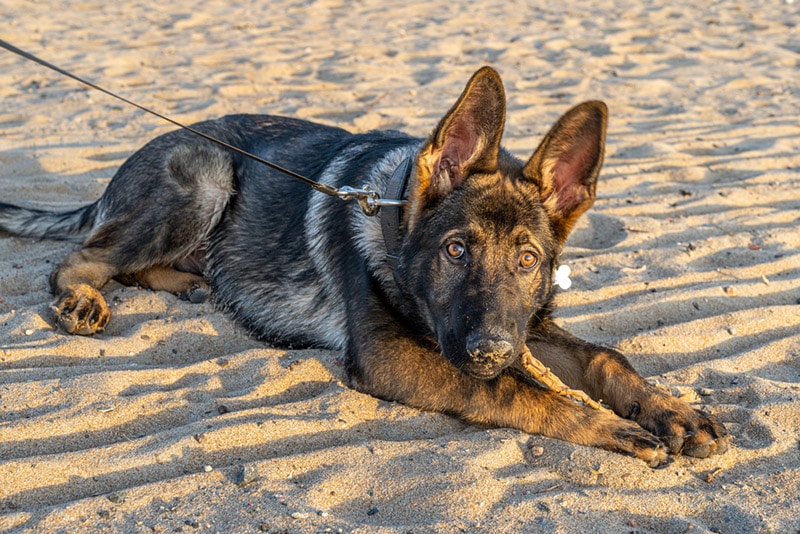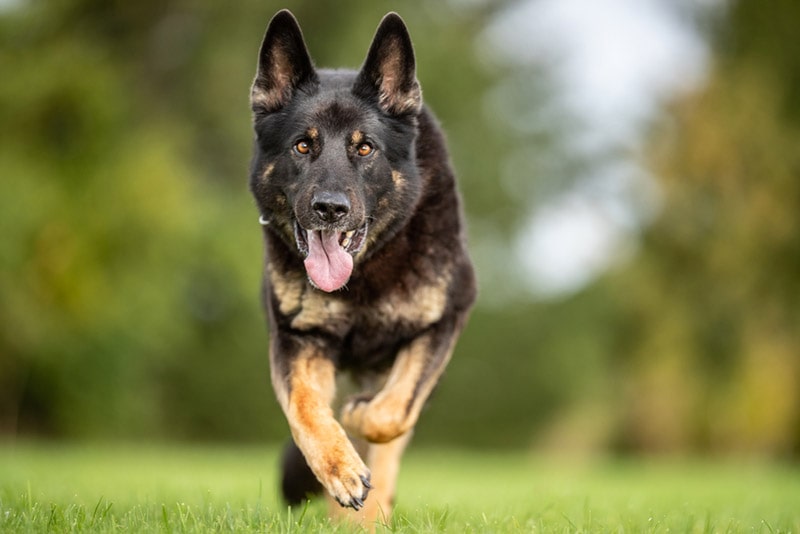West German Shepherd: Info, Temperament, Care & Facts

Updated on

West German Shepherd dogs are known for their unwavering loyalty, intelligence, and courage, making them excellent companions for both families and individuals. However, understanding their temperament, personality, and traits is key to unleashing the best of the West German Shepherd. From their history to their physical traits, we will explore everything you need to know about the West German Shepherd. Whether you already have one or are considering adding one to your family, this guide will provide you with the tools to ensure a happy and healthy relationship with your furry friend.
| Height: | 22–26 inches |
| Weight: | 50–90 pounds |
| Lifespan: | 7–10 years |
| Colors: | Black and tan, black and silver, black and creme, brown sable, brindled, black and silver, and silver sable |
| Suitable for: | Active families, those looking for a larger dog that’s energetic and friendly |
| Temperament: | Highly intelligent, loyal, friendly, and get along well with other animals and children |
The West German Shepherd is a highly intelligent and versatile breed of dog that has been popular for many years. One of the most interesting things about this breed is its unique appearance. West German Shepherds are known for their striking black and tan coats, which are typically longer and thicker than those of other German Shepherd varieties. They also tend to have a more muscular and athletic build, with a larger head and wider shoulders.
West German Shepherd Breed Characteristics
West German Shepherd Breed Puppies
West German Shepherd puppies are highly sought after for their intelligence, loyalty, and protective instincts. However, the cost of these puppies can vary widely depending on various factors, such as the breeder, location, pedigree, and lineage. On average, you can expect to pay anywhere from $500 and even up to $2,500 for a West German Shepherd puppy, believe it or not.
The price range may seem broad, yes, but it’s important to remember that cheaper puppies may come from less reputable breeders or may have health issues. On the other hand, more expensive puppies may come from champion bloodlines or have undergone extensive health testing and screening. So, it’s absolutely crucial to really do some research and find a quality breeder who prioritizes vet care and the overall health of their puppies.
Additionally, the cost of owning a West German Shepherd goes beyond the initial purchase price. These dogs require regular veterinary check-ups, proper nutrition, training, and exercise to maintain their physical and mental well-being.
Temperament & Intelligence of the West German Shepherd
Are These Dogs Good for Families? 👪
They do. They’re actually excellent family dogs, provided they’re well-trained and socialized from an early age. These dogs have a strong work ethic and love to have a job to do, which makes them excellent protectors of their families. They’re also gentle and patient with children, making them ideal family pets.
However, note that West German Shepherds require plenty of exercise and mental stimulation to stay happy and healthy. Families considering this breed should be prepared to provide regular exercise and training to ensure that their dog develops good behavior habits. Overall, these Shepherds can make wonderful additions to families who are willing to put in the time and effort needed to care for them properly.

Does This Breed Get Along With Other Pets?
Whether or not they get along with other pets depends on a few factors. The temperament and socialization of the individual dog and the personality of the other pets in the household play an important role. Generally, if a West German Shepherd is properly socialized and trained from a young age, then yes, they can coexist peacefully with other pets.
However, it’s best to monitor their interactions and provide proper training to ensure everyone’s safety. It’s also important to note that West German Shepherds have a super strong prey drive, so caution should be taken when introducing them to smaller animals like cats or rabbits.
Things to Know When Owning a West German Shepherd
Food & Diet Requirements 🦴
West German Shepherds are highly active dogs with a muscular build. So, they require a balanced diet that provides them with the energy and nutrients they need to maintain their active lifestyle, and foods specifically for large breeds are ideal. A diet that’s high in protein, moderate in fat, and low in carbohydrates is ideal for this breed. Great dog food brands for these canines include Blue Buffalo Life Protection Formula Adult, Purina Pro Plan Adult Shredded Blend Beef & Rice Formula, and Taste of the Wild Pacific Stream Smoke-Flavored Salmon dog food.
Protein is an essential nutrient for West German Shepherds, as it helps to maintain their muscle mass. Good sources of protein include chicken, turkey, beef, and fish. So, ensure that the protein comes from high-quality sources and is easily digestible. A diet that’s rich in animal-based protein is recommended for this breed.
In addition to protein, these dogs require healthy fats in their diet to help maintain their skin and coat health. Fats also provide them with energy and help to regulate their body temperature. Good sources of healthy fats include fish oil, flaxseed oil, and chicken fat. They should be fed multiple small meals throughout the day rather than one large meal to prevent bloat or other digestive issues.

Exercise 🐕
These Shepherds are extremely active and energetic dogs that require a lot of exercise on a daily basis. These dogs are bred for working and have a strong desire to run, jump, and play. They have a high stamina level and need to be kept busy to prevent them from becoming bored or destructive. It’s recommended that these dogs receive at least 2 hours of exercise every day to maintain their physical and mental health.
The best forms of exercise for West German Shepherds are those that allow them to use their natural instincts and capabilities. Activities such as hiking, running, and playing fetch are ideal for these dogs. They also enjoy agility training and obedience classes, which can help to keep them mentally stimulated and physically fit. So, it’s essential to provide these dogs with a variety of different activities to prevent them from becoming bored or restless.
Owners should ensure that their West German Shepherds receive adequate exercise each day to prevent obesity and other health problems.
Training 🎾
West German Shepherds are highly intelligent and energetic dogs that require consistent and effective training to reach their full potential. Here are some training tips that can help you to train your West German Shepherd and ensure that he becomes a well-behaved and obedient companion.
The first tip is to start training your West German Shepherd at a young age. Puppies are more receptive to learning and can quickly pick up new commands and behaviors. Begin with basic commands, such as sit, stay, come, and heel, and gradually increase the difficulty of the training as your puppy progresses.
Consistency and planning are very important when it comes to training your West German Shepherd. You should use the same commands and techniques every time you train your dog to avoid confusion and ensure that he understands what is expected of them. Additionally, you should know what you want to train your dog on and how to best go about it. Also, be sure to reward good behavior with treats or verbal praise to reinforce positive behaviors.
Another important training tip for West German Shepherds is socialization. These dogs can be protective and territorial by nature, so it’s essential to expose them to different people, animals, and environments from an early age. This will help them to develop confidence and adaptability, which are essential traits for a well-rounded dog.

Grooming ✂️
West German Shepherds are a popular breed known for their intelligence, loyalty, and athleticism. Proper grooming is essential to keep them healthy and comfortable. Here are some grooming tips for grooming these Shepherds.
Know that brushing is crucial for West German Shepherds. They have a thick double coat that sheds heavily, especially during shedding seasons. Brushing their coat once a week will help remove loose fur, prevent matting, and help reduce the ability for fleas/ticks to nip at them. Use a slicker brush and a metal comb to remove tangles and knots from the fur. Be gentle while brushing their undercoat, as it can be sensitive.
Bath Time
Bathing your West German Shepherd should be done only when necessary. Over-bathing can strip their skin of its natural oils and cause dryness and itching. Use a mild dog shampoo and warm water to bathe them. Rinse thoroughly to ensure no shampoo residue is left behind. After bathing, towel dry your dog and use a blow dryer on low heat to dry their coat.
Nail Trimming
Trimming your Shepherd’s nails is also important for their hygiene. Long nails can cause discomfort and even pain while walking or running. Use a sharp nail clipper and cut the tip of each nail, avoiding the quick (the pink part) that contains blood vessels and nerves. If you are not confident in trimming your dog’s nails, seek help from a professional groomer or veterinarian.
Ear Cleaning
Cleaning your West German Shepherd’s ears is another vital part of grooming. Check their ears regularly for wax buildup, redness, or foul odor (which can mean there’s an infection). Use a dampened cotton ball along with a vet-approved ear cleaner to wipe out the Shepherd’s ears. Avoid using small tools, such as cotton-based swabs or metal objects, as they may actually push the wax (or dirt) further into the dog’s ear canal.
Health and Conditions 🏥
West German Shepherds are known for their intelligence, loyalty, and courage, making them a popular choice for families and law enforcement agencies. However, like all breeds, they are susceptible to certain health conditions.
- Allergies
- Hot spots
- Ear infections
- Dental issues
- Hip dysplasia
- Degenerative myelopathy
Hip Dysplasia
Hip dysplasia is a genetic condition that affects many large dog breeds, including West German Shepherds. It occurs when the hip joint doesn’t develop properly, leading to pain and mobility issues. Dogs with severe hip dysplasia may require surgery to correct the problem, while others may manage the condition with pain medication and lifestyle changes.
Degenerative Myelopathy
Degenerative myelopathy is another genetic condition that affects West German Shepherds. It is a progressive disease that affects the spinal cord, leading to weakness and eventually paralysis. While there is no cure for degenerative myelopathy, there are treatments available that can help slow the progression of the disease and manage signs.
Allergies
German Shepherds are really prone to allergies. These allergies can be triggered by various factors such as food, pollen, dust mites, and other environmental allergens. The signs of allergies in German Shepherds include itching, redness, skin irritation, and hair loss. It’s essential to identify the allergen causing the reaction to provide the dog with appropriate treatment.
To manage allergies in German Shepherds, pet owners should take several preventative measures. They should ensure that their dogs have a healthy and balanced diet and avoid foods that can trigger allergic reactions. Regular grooming and bathing can also help reduce the risk of allergies in these dogs by removing allergens from their skin and fur.
If a German Shepherd is diagnosed with an allergy, several treatment options can be prescribed by veterinarians. Antihistamines, corticosteroids, and immunotherapy are some common treatments used to manage allergies in dogs.
Hot Spots
Hot spots, also known as acute moist dermatitis, are red, itchy, and painful skin lesions that can appear suddenly on a dog’s skin. These spots can grow quickly and spread, causing discomfort to the dog and leading to further complications if left untreated. Hot spots in Shepherds can be caused by a variety of factors, such as allergies, parasites, poor grooming, and stress.
The signs of hot spots include itching, licking, and biting the affected area, redness and inflammation, and oozing or crusting of the skin. To prevent hot spots in Shepherds, it’s important to maintain good hygiene and grooming practices. Regular brushing and bathing can help keep the skin clean and free from dirt and debris. A healthy diet and regular exercise can also boost the immune system and prevent infections.
Ear Infections
Due to their floppy ears, these Shepherds are particularly susceptible to ear infections. Signs of an ear infection include shaking the head, scratching at the ears, and a really bad odor coming from the ears. Treatment typically involves cleaning the ears thoroughly and administering medication given by a vet (and in some cases, an antibiotic).
Dental Issues
Dental problems are also common among West German Shepherds. Without proper dental care, dogs can develop gum disease, which can lead to tooth loss and other health issues. To prevent dental problems, it is important to brush your dog’s teeth regularly and provide them with chew toys that help clean their teeth.
 Male vs. Female
Male vs. Female
West German Shepherds are a popular breed of dogs that are known for their intelligence, loyalty, and protective nature. While they are very similar in many ways, there are some differences between male and female Shepherds that are worth noting.
One of the most notable differences between male and female West German Shepherds is their height and weight – like with most other animals. Generally, male Shepherds are larger and heavier than females. This is due to the fact that males have more testosterone, which helps them to develop more muscle mass and bone density. On the other hand, females tend to be a bit smaller and lighter, which can make them easier to handle and train.
Another difference between male and female Shepherds is their personality. Though both sexes are known for their loyalty and protective instincts, the males tend to be more independent and dominant, while the females are more affectionate and nurturing. This can make a difference in how they interact with their owners and other animals, as well as how they respond to training.
And in terms of health, male and female Shepherds have some differences as well. For example, males are more prone to certain health issues such as hip dysplasia and testicular cancer, while females are more likely to develop urinary tract infections and certain types of cancer. It’s important for owners of both genders to be aware of these potential health risks and take steps to prevent them.
The 5 Little-Known Facts About the West German Shepherd
1. They Have an Easily Recognizable Face
One of the most interesting features of the West German Shepherd’s face is its black mask. This is a genetic trait that is common in the breed and adds to its distinctiveness. The mask covers the dog’s muzzle and extends up to the eyes, creating a striking contrast with the lighter fur on the rest of the face. Some West German Shepherds also have black markings on their eyebrows, further enhancing their facial expressions.
2. Their Faces Have Evolved a Lot Due to Breeding
Moreover, the West German Shepherd’s face has evolved over time to meet the demands of its working roles. The breed was originally developed in Germany in the late 19th century as a herding dog, but it quickly became popular with law enforcement agencies for its intelligence, strength, and courage. As a result, breeders began to select dogs with more robust facial features, including stronger jaws and thicker muzzles, to enable them to perform tasks such as biting and holding criminals. This has resulted in a more powerful-looking face that is well-suited to the breed’s working abilities.
3. They’re Very Vocal
German Shepherds have a reputation for being vocal dogs, and this trait is not without reason. German Shepherds are a breed that was originally developed to be working dogs, and their vocalizations were an integral part of their job. They were bred to be herding dogs, and one of the ways they would control and direct the sheep was through vocal commands. As a result, Shepherds have a natural inclination to be vocal, and they will often bark, howl, or whine to communicate.
They’re very vocal dogs and will often “talk” to their owners in a variety of ways, including barking, whining, and growling. They’re also very expressive with their body language and can communicate a lot through their posture and movements.

4. They Were Originally Used for Herding
West German Shepherds were originally bred in Germany in the late 19th century. They were originally used as herding dogs but were later trained as police and military dogs due to their intelligence and obedience. Today, they are also popular as family pets and therapy dogs.
5. Their Sense of Smell Is Amazing
German Shepherds are known for their exceptional abilities as working dogs, and one of their most impressive attributes is their sense of smell. These dogs have an amazing sense of smell that allows them to detect scents that humans can’t even perceive. They have more than 220 million scent receptors in their noses, which is about 40 times more than humans. This makes them ideal for tasks such as search and rescue, drug detection, and even detecting diseases like cancer.
The German Shepherd’s sense of smell is so advanced that they can track a scent for miles or detect odors that are buried deep underground. They are also able to differentiate between different scents and identify specific odors, making them highly effective at their jobs.
Final Thoughts
Another fascinating aspect of the West German Shepherd is its temperament. These dogs are highly trainable and make excellent companions for families, law enforcement agencies, and other organizations that require a loyal and obedient canine partner. They’re also known for their protective instincts, which make them ideal guard dogs. However, it’s important to socialize and train these dogs properly to ensure they do not become overly aggressive or possessive.
Overall, the West German Shepherd is a fascinating dog breed that will make a great pet or companion for anyone looking for a dog. With their striking appearance, intelligence, and loyal nature, it’s easy to see why these dogs are so beloved.
Featured Image Credit: lancegfx, Pixabay

 Male vs. Female
Male vs. Female








